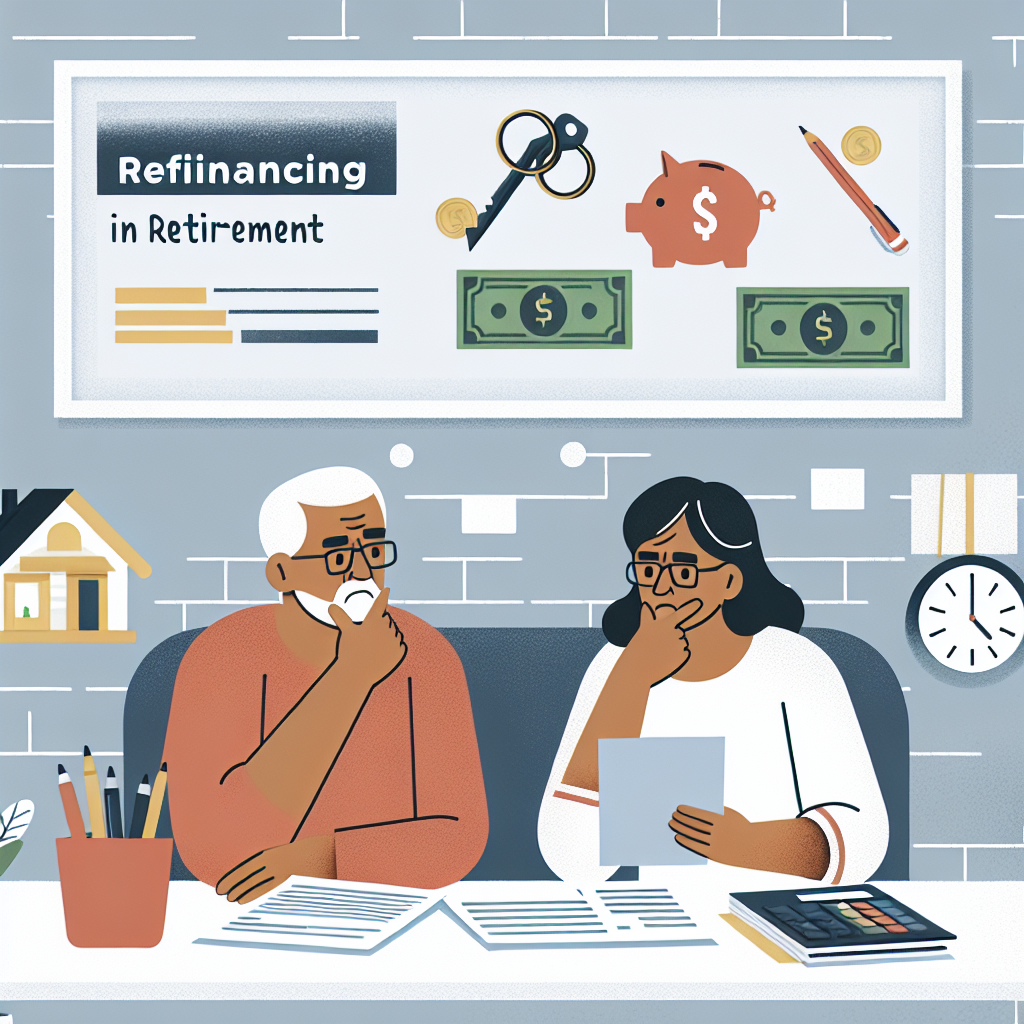Navigating financial decisions during retirement can be daunting, especially when it comes to refinancing your home. With a wealth of options available, understanding your choices is crucial. In this article, we’ll delve into what homeowners should consider when thinking about refinancing in their golden years.
Understanding Refinancing
What is Refinancing?
Refinancing involves replacing your existing mortgage with a new loan that typically has different terms, such as a lower interest rate, a shorter loan duration, or altered monthly payments. For retirees, the primary motive often revolves around reducing monthly financial burdens and tapping into home equity.
Why Choose to Refinance in Retirement?
-
Lower Monthly Payments: Securing a lower interest rate can substantially reduce monthly mortgage payments, providing more disposable income for other expenses.
-
Access to Cash: Homeowners might consider refinancing a home to cash out equity, using the funds for medical expenses, travel, or a financial buffer for unexpected costs.
- Shorter Loan Terms: Refinancing to a shorter loan term can save money on interest, allowing homeowners to pay off their debt more quickly.
Key Considerations Before Refinancing
Financial Stability
Before deciding on refinancing, it’s essential to evaluate your overall financial situation. Are you financially stable with a steady income stream? Are you comfortable with your current expenses? Assessing these factors will ensure refinancing aligns with your retirement goals.
Credit Score Impact
A higher credit score can lead to more favorable refinancing terms. Before pursuing refinancing, check your credit report and score. If your score has improved since you first acquired your mortgage, you may qualify for lower interest rates.
Current Mortgage Terms
It’s vital to compare your existing mortgage terms with potential refinancing options. Determine if the savings on interest will offset the costs associated with refinancing, such as closing costs and fees. For many retirees, this evaluation is crucial in making an informed decision.
Pros and Cons of Refinancing in Retirement
Pros
-
Lower Interest Rates: Benefit from historically low-interest rates that could significantly decrease your monthly payments.
-
Increased Cash Flow: With reduced payments or cash-out options, retirees may find themselves with increased cash flow for leisure activities, travel, or unforeseen expenses.
- Debt Consolidation: For retirees juggling multiple debts, refinancing can condense obligations into a manageable monthly payment.
Cons
-
Closing Costs: Refinancing comes with closing costs, often ranging from 2% to 5% of the loan amount. This cost can be a deterrent for those on fixed incomes.
-
Longer Loan Term: Choosing a longer loan term to minimize monthly payments can result in paying more interest over time, countering some of the benefits of refinancing.
- Risk of Foreclosure: Borrowers who encounter financial difficulties may face the risk of foreclosure, especially when extending the loan term increases debt obligations.
Types of Refinancing Options
Rate-and-Term Refinance
This option allows homeowners to refinance at a lower rate or modify loan terms without taking out additional cash. It’s best suited for those looking to reduce monthly payments while not accessing home equity.
Cash-Out Refinance
This is ideal for retirees looking to access their home equity. By refinancing for more than the existing mortgage balance, homeowners can take out additional cash to fund various expenses.
FHA Streamline Refinance
For retirees with existing FHA loans, this streamlined process requires minimal documentation and can lead to quicker approval with reduced costs.
When to Refinance in Retirement
Timing Matters
The optimal time to refinance often corresponds with interest rate drops or changes in your financial circumstances. Always conduct a thorough analysis of current market conditions and assess personal financial goals before moving forward.
Seeking Professional Advice
Engaging a financial advisor or mortgage expert is essential, particularly for navigating the complexities of retirement finance. These professionals can provide tailored advice based on individual financial situations and goals.
Conclusion
Refinancing during retirement can be a strategic financial decision, offering benefits such as lower payments, access to cash, and improved cash flow. However, it’s essential to weigh the pros and cons, evaluate your financial stability, and choose the right refinancing option that aligns with your retirement goals. With thoughtful consideration and professional guidance, refinancing can enhance your financial security and provide peace of mind in your golden years.
Final Thoughts
As you explore the possibilities of refinancing in retirement, remember that your home can be a powerful asset. Take the time to evaluate your options, consult with financial experts, and make an informed decision that ensures a comfortable and secure retirement.

